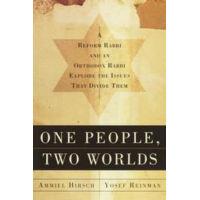Book Review: One People, Two Worlds

Orthodox and Reform rabbis engage in serious dialogue about as often as the Red Sea splits or the Red Sox win the World Series. Orthodox leaders generally forbid rabbis from participating in interdenominational forums, fearing that sharing a platform with a Reform rabbi would legitimize the Reform position. As a result, most direct communication between the two groups is limited to the occasional condemnation or accusation. The two groups may believe they belong to one people, but they clearly live in two separate worlds.
That's why the aptly named One People, Two Worlds is so refreshing. The book consists of an email dialogue between Orthodox Rabbi Yosef Reinman and Reform Rabbi Ammiel Hirsch over a period of nearly two years. In long, deliberate posts, the rabbis debate the most contentious issues that divide their worlds, including the origin of Torah, halacha vs. personal autonomy, Zionism, the role of women in Jewish life, and the role of Jews in the world. Both are talented writers who believe passionately in their ideology. They maintain a friendly tone throughout, but an underlying tension remains tangible.
Both rabbis spend most of the book laying out the standard arguments for their positions. But as the book progresses they also develop a fascinating dynamic. Both writers admit they are trying to reach the same audience - non-Orthodox readers - but for entirely different reasons. Reinman want to teach them the "classic" Torah position and maybe bring a few readers into his camp. Hirsch just wants Reform readers to see that he can debate his Orthodox colleague as an equal.
To advance his personal agenda, Hirsch tries to bridge the gap between him and Reinman as much as possible, ostensibly to show how open and accepting the Reform worldview is, but also to show how much common ground there is between Reform and Orthodox ideology. He also makes extensive use of Talmudic passages and quotes from the classic Torah commentators. His goal, of course, is to show that Reform did not spring to life fully formed in the liberal tradition of the Enlightenment. In Hirsch's hands, Reform Jews, not the Orthodox, are the true heirs of the Talmudic tradition, at least in spirit. If they don't always follow the letter of the law as expressed by the Talmudic sages, it's because times have changed. And, as Hirsch demonstrates, no one was more concerned with the need for change than Chazal.
In contrast, Reinman wants to show how far Reform has drifted from the sources and how shakey his colleague's knowledge of Torah really is. He completely rejects every single Torah reference Hirsch makes as either "distorted," "misinterpreted," or "wrong." The two have a lengthy debate on the meaning of a single, ultra-ambiguous line from Ibn Ezra. Reinman is appalled that Hirsch tries to suggest Ibn Ezra supported a Reform methodology. Other quotes are treated in the same manner - Reinman complements Hirsch on his erudition in finding the references, then tells him what they "really" mean. His message is clear: Reform rabbis have no authority to interpret the verses because they don't accept their traditional meaning. If one lacks an insight into what the tradition is teaching us, Reinman seems to be saying, how can that person know when the tradition needs to change?
Another theme running through the book is the question of absolute certainty. Hirsch tries to show that people can never be absolutely certain about spiritual matters, that there is a difference between religious knowledge and scientific knowledge. When Reinman suggests that Jewish life revolves around the search for absolute truth, Hirsch answers that the Orthodox are not searching for truth, but rather claim to own it. And people who believe they own the truth are dangerous, he says.
Reinman responds that Orthodox Jews are searching for the truth and claim to own it in the form of the Torah. "Absolute truth is certainly revealed in the divine Torah, but we cannot simply open to to, let's say, page 134 to check it out," Reinman writes. "We have to study and think over and over again until we can discern the transcendent truth of existance within the pages of the Torah."
By the end of the book, both writers made strong cases for their positions. Personally, I found Hirsch more interesting because the Reform views were new to me. But I found Rienman more convincing, perhaps because I agreed with him from the beginning. Reinman also seemed to write considerably more pages. His posts tended to be longer than Hirsch's and he wrote more of them.
The rabbis stated at the start they did not expect to overcome the gaps between them, and they were right. The differences in their views remain acute. But I, for one, am grateful they made the effort. They remain one people, even if they live in different worlds, a condition infinitely preferable to its alternative: two people living in one world.

2 Comments:
very good review. makes me want to read the book. the additional paragraphs do add fullness and closure...
I read the book a while back, and wrote about it here:
One People, Two Worlds
I found that I really appreciated the fact that these two rabbis were open enough to engage in the dialogue, but ultimately, I didn't find it so much a dialogue, but two people pressing their respective (and not necessarily coinciding or even contrasting) agendas against one another. I found that a lot of questions went unanswered in exchange for making each one's own argument. Still, I was happy that the book was written and published, and felt it was a great step in the right direction towards interdemoninational unity. It was an interesting read, and I learned a lot from it.
Post a Comment
<< Home